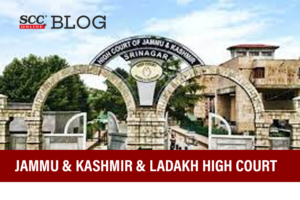Jammu and Kashmir and Ladakh High Court: While deciding the instant petition seeking to set aside Section 306(4)(b) Criminal Procedure Code on being unconstitutional/unreasonable for putting restrictions upon the powers of the Trial Court to release the approver on bail, the bench of Mohan Lal J.*, stated that the dominant object of keeping an approver to be detained in custody till the termination of trial is not intended to punish the approver for having come forward to give evidence in support of prosecution, but to protect him from possible indignation, rage and resentment of his associates in a crime to whom he was chosen to expose.
It was pointed out that Section 306(4)(b) is based on public interest, and there cannot be any quarrel with legal position that in terms of section 306(4)(b) bail to approver who was in custody cannot be granted, however, in an appropriate case, High Court can release the approver on bail in exercise of its inherent power u/s 482 of Criminal Procedure Code.
The petitioner has been facing trial before the Court of 3rd Additional Sessions Judge (with powers under NIA Act) at Jammu in Nagrota Terrorists attack case. It was claimed that the petitioner is neither criminal nor a terrorist, but an innocent businessman who was implicated in the case by the other accused persons. He has been behind the bars since 2018.
During the pendency of trial, petitioner was made approver in the said case, wherein, he accepted to be such witness with the promise extended by the Trial Court, and in pursuant thereto, the petitioner has already deposed before the Trial Court, as prosecution witness.
It was therefore submitted by the petitioner that at this stage, he is entitled for grant of bail and that his release would advance the case of justice, whereas a denial thereto will defeat the same and result into the grave miscarriage of justice to the petitioner apart from infringing his constitutional right.
The petitioner further submitted that the provisions contained in Section 306(4)(b) CrPC mandate that unless the accused is already on bail he shall be detained in custody until the termination of trial operates as complete bar on the powers of Criminal Court to release approver on bail. However, the High Court has the inherent powers u/s 482 CrPC to pass any order including release of approver on bail to meet the ends of justice.
Upon perusing the facts, the Court noted that Section 306 appears to be an exception to the general principles of criminal law. This provision has been incorporated to ensure that the preparators of crime are punished and do not go scot free. “If a person who has committed crime, volunteers to make a clean breast of all the true facts about the circumstances relating to the offence and all other persons involved in the commission of the crime, the State, by enacting aforementioned provision has extended promise to such person that after fulfilling the terms and conditions therein, he will get benefit of the pardon which has been tendered to him meaning thereby, that he would not be punished, but would be set at liberty.”
The Court observed that the intention of the legislature in enacting Section 306, CrPC has to be seen in the backdrop of securing a crime free society. Invoking Art. 21 of the Constitution, the Court deliberated the purpose of keeping an approver in detention thereafter. It was pointed out that Section 306(4)(b) CrPC cannot be interpreted in a manner which would defeat the mandate contained in Article 21. “What purpose it is to be achieved by keeping an approver in custody during the trial after he satisfactorily complied with the terms and conditions of tender of pardon? He gets right to be released and cannot be allowed to remain in jail custody indefinitely”.
The Court while relying on several judicial precedents, pointed out that the dominant object is, that once an accused is granted pardon under the relevant provisions of the Criminal Procedure Code, he ceases to be an accused and appears witness for the prosecution.
The Court thus allowed the instant petition and admitted the petitioner to bail on his furnishing surety bond in the sum of Rs. 50000.
[Tariq Ahmed Dar v. National Investigation Agency, 2023 SCC OnLine J&K 236, decided on 11-04-2023]
*Judgment written by Justice Mohan Lal.
Advocates who appeared in this case :
Petitioner- Gagan Kohli, Advocate;
Respondent- Vishal Sharma, DSGI.

